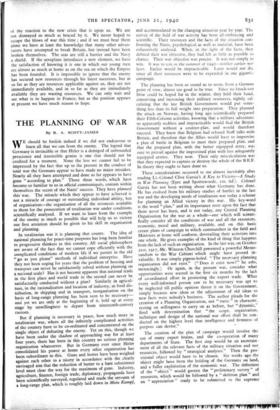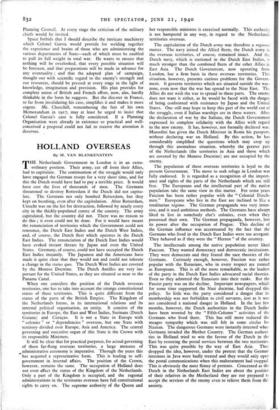THE PLANNING OF WAR
By R. A. SCOTT-JAMES
'WE should be foolish indeed if we did not endeavour to learn all that we can from the enemy. The legend that Germany is invincible or that Hitler is a demigod of unbounded prescience and irresistible genius is one that should not be credited for a moment. None the less we cannot fail to be impressed by the fact that up to the present in the conduct of total war the Germans appear to have made no major mistakes. Nearly all they have attempted and done so far appears to have gone " according to plan." Those three words, which have become so familiar to us in official communiqués, contain within themselves the secret of the Nazis' success. They have planned this war. The miracle which they appear to have achieved is not a miracle of courage or outstanding individual ability, but of organisation—the organisation of all the resources available to them for the prosecution of totalitarian war under conditions scientifically analysed. If we want to learn from the example of the enemy as much as possible that will help us to victory our first attention should be given to his skill in organisation and planning.
In totalitarian war it is planning that counts. The idea of national planning for peace-time purposes has long been familiar to progressive thinkers in this country. All social philosophers are aware of the fact that we cannot cope efficiently with the complicated conditions of modern life if we persist in the old " go as you please" methods of individual enterprise. Have they not been urging for years that the problem of housing and transport can never be satisfactorily solved without planning on a national scale? Has it not become apparent that national trade in the first place and world trade in the second can never be satisfactorily conducted without a plan? Similarly in agricul- ture, in the rationalisation and location of industry, m food dis- tribution, in shipping and in transport, reorganisation on the basis of long-range planning has been seen to be necessary— and yet we are only at the beginning of it, held up at every stage by unwillingness to depart from nineteenth-century custom.
But if planning is necessary in peace, how much more in totalitarian war, where all the infinitely complicated activities of the country have to be co-ordinated and concentrated on the single object of defeating the enemy. Yet on this, though we have been under the shadow of approaching war for at least four years, there has been in this country no serious planning organisation whatsoever. But in Germany ever since Hitler consolidated his power at home every other organisation has been subordinate to this. Guns and butter have been weighed against each other to a nicety in accordance with the clearly envisaged aim that the reduction of butter to a bare subsistence level must clear the way for the maximum of guns. Industry, agriculture, finance, foreign trade, diplomacy, propaganda have been scientifically surveyed, regulated and made the servants of a long-range plan, which is roughly laid down in Mein Kampf, and accommodated to the changing situation year by year. The survey of the field of war activity has been all-embracing and scientific. Their resources and the facts of the situation con- fronting the Nazis, psychological as well as material, have been exhaustively analysed. When, in the light of the facts, they defined their war objective, they had left as little as possible to chance. Their war objective was precise. It was not simply to win. It was to win in the summer of 1940—neither earlier nor later. Earlier would be impracticable. Later would not do, since all their resources were to be expended in one gigantic campaign.
The planning has been so sound as to seem, from a German point of view, almost too good to be true. Since no knock-out blow could be hoped for in the winter, they held their hand, conserving and increasing their military resources, rightly cal- culating that the late British Government would put some- thing less than its full weight into preparation. They planned the attack on Norway, having long ago scientifically prepared their Fifth-Column activities, knowing that a military adventure so apparently reckless and impracticable would find the British Government without a counter-plan, and would therefore succeed. They knew that Belgium had refused Staff talks with Britain, and therefore that the Allies would have to improvise a plan of battle in Belgium to meet their prepared plan, and that the prepared plan, with the better equipped army, was sure to prevail against the improvised plan with less adequately equipped armies. They won. Their only miscalculation was that they expected to capture or destroy the whole of the B.E.F. In theory they ought to have done so.
These considerations occurred to me almost inevitably after reading Lt.-Colonel Clive Garsia's A Key to Victory—A Study in War Planning (Eyre and Spottiswoode, 1os. 6d.). Colonel Garsia has not been writing about what Germany has done. He has evolved from his military studies of battles in the last war and the developing needs of totalitarian war today a scheme for planning an Allied victory in this war. His key-word is the word " plan," and its importance rests upon the fact that there never has been, and is not today, any Central Planning Organisation for the war as a whole—one which will scienti- fically consider all the conditions of war and all the resources, economic, moral and military, available, and on this basis create plans of campaign to which commanders in the field and Ministers at home will conform, dovetailing their activities into one whole. He gives examples of the kind of thing that happens from the lack of such an organisation. In the last war, on October 21st, 1917, Mr. Winston Churchill presented a powerful Memo- randum to the War Cabinet which might have proved in- valuable. It was simply pigeon-holed. " The necessary planning organisation did not exist." (" Does it exist now?" he asks, menacingly.) Or again, in the present war, consider what opportunities were wasted in the first six months by the lack of co-ordinated effort in promoting the export trade. What every well-informed person saw to be necessary was apt to be neglected till public opinion thrust it on the Government, simply because new ideas or the adjustment of old ideas to new facts were nobody's business. The author pleads for the creation of a Planning Organisation, not " static " in character, resting on willingness to carry on as before, but " dynamic," fired with determination that " the scope, organisation, technique and design of the national war effort shall be con- ducted on the highest level that intelligence and firmness of purpose can devise."
The creation of the plan of campaign would involve the use of many expert brains, and the co-operation of many departments of State. The first step would be an ascertain- ment of all the relevant facts of the military situation and our resources, followed by " strategical analyses." Then the prof visional object would have to be chosen. Six weeks ago the object might have been the holding of the Germans on land, and a fuller exploitation of the economic war. The definition of the " object " would govern the " preliminary survey " of resources, which would be followed by a " skeleton plan " and an " appreciation " ready to be submitted to the supreme Planning Council. At every stage the criticism of the military chiefs would be invited.
Space forbids that I should describe the intricate machinery which Colonel Garsia would provide for welding together the experience and brains of those who are administering the various departments of State—each of which must be enabled to pull its full weight in total war. He wants to ensure that nothing will be overlooked, that every possible situation will be foreseen, and that preparations will be made in advance for any eventuality ; and that the adopted plan of campaign, thought out with scientific regard to the enemy's strength and our resources, should be pressed at every stage in the light of knowledge, imagination and prevision. His plan provides for complete union of British and French effort, now, alas, hardly thinkable in the form he suggests. But the disaster in France, so far from invalidating his case, simplifies it and makes it more cogent. Ar. Churchill, remembering the fate of his own Memorandum in 1917, may at least be urged to insist that Colonel Garsia's case is fully considered. If a Planning Organisation were already in existence so practical and well- conceived a proposal could not fail to receive the attention it deserves.































 Previous page
Previous page